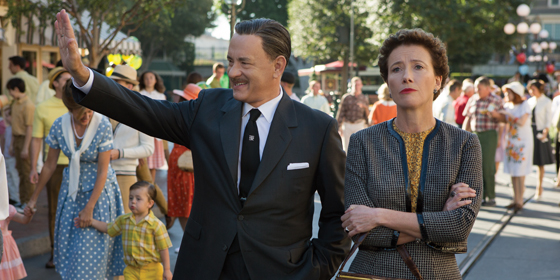The story behind the film version of Mary Poppins (1964) is the subject of a clever and charming new film about the clash between the English author Pamela ‘PL’ Travers and famed studio head Walt Disney.
When we first see the elder Travers (Emma Thompson) in 1961 she is running short of money, due to declining book sales, and her agent is urging her to accept the offer of a trip to Los Angeles to meet Walt Disney (Tom Hanks), the mogul who has pursued the rights to the project for 20 years.
Having promised his two daughters to turn their favourite book into a movie, he is very keen on the idea of a big budget musical, granting her full creative input into the project, something he rarely did.
Unfortunately, he doesn’t realise that Travers actively hates the idea of a musical and resists almost all the suggestions from the creative team at the studio (a trio played by Bradley Whitford, B. J. Novak and Jason Schwartzman).
Gradually, through flashback, we discover the reasons for her reluctance may lie in her childhood, when she grew up in Australia with a loving but troubled father (Colin Farrell).
On the surface, this may appear like another slickly produced Disney feel-good comedy.
Whilst it is certainly all that, the film has its own interesting backstory.
The origins of the project lie in a 2002 TV documentary about Travers, which eventually led to Allison Owen coming on board as producer and eventually a script credited to Sue Smith and Kelly Marcel made 2011s ‘Black List’ (an unofficial survey of the years best unproduced scripts).
Then, in a strange reverse parallel to the film, the producers had to persuade the notoriously sensitive Disney that they would not trample on Walt’s legacy.
Eventually, the Mouse House relented to the first ever depiction of Walt Disney on screen and the finished film is mostly a charming surprise.
This is due in large part to Emma Thompson and Tom Hanks, whose constant sparring provides a lot of the comedic sparks.
Thompson’s Travers is a perpetually defiant English woman who manages to hide a troubled past, whilst Hanks plays Disney as a loveable, charming uncle who’s drive and ambition are never far from the surface.
To an extent, the film glosses over the thornier aspects of each character: there is no mention of Travers’ unconventional personal life or the darker side of Disney. However, this is not entirely a bad thing as a warts-and-all drama would have been out of the question for a mainstream Disney release.
But the end result is not just a sanitised product but a rather sly portrait of a spanner in the Hollywood machine.
It is in essence an exploration of ‘creative differences’ — that well-worn phrase so beloved of Tinseltown to maintain the idea that idea that raging rows were amicable disagreements.
Some of the funniest scenes in Saving Mr. Banks come in the rehearsal room, where Travers is aghast at some of the songs and suggestions that are now so beloved by fans of the 1964 film.
These are executed with a light touch that is unfortunately not true of the extended flashback sequences which dwell a bit too clumsily on her childhood.
Make no mistake, this is a manipulative film and the hiring of Thomas Newman to score it only adds to its seductive power, with his lush hanging strings and signature instrumentation providing a lightness to the comedy and emotion to the drama.
As Walt Disney ultimately persuades P.L. Travers to accept the idea of a movie, we can see what a driven man he was, whilst at the LA premiere we can be moved at the author’s reaction to the film, even if that may not have been exactly as presented here.
She told the BBC in 1977 that she had ‘learned to live with the film,’ which is a hardly a ringing endorsement.
But then maybe this film, like the musical and the original book, is just another pleasurable fantasy.
Is pleasure such a bad thing?
Saving Mr. Banks closed the London Film Festival on Sunday 20th October
(It opens in the UK on November 26th)
